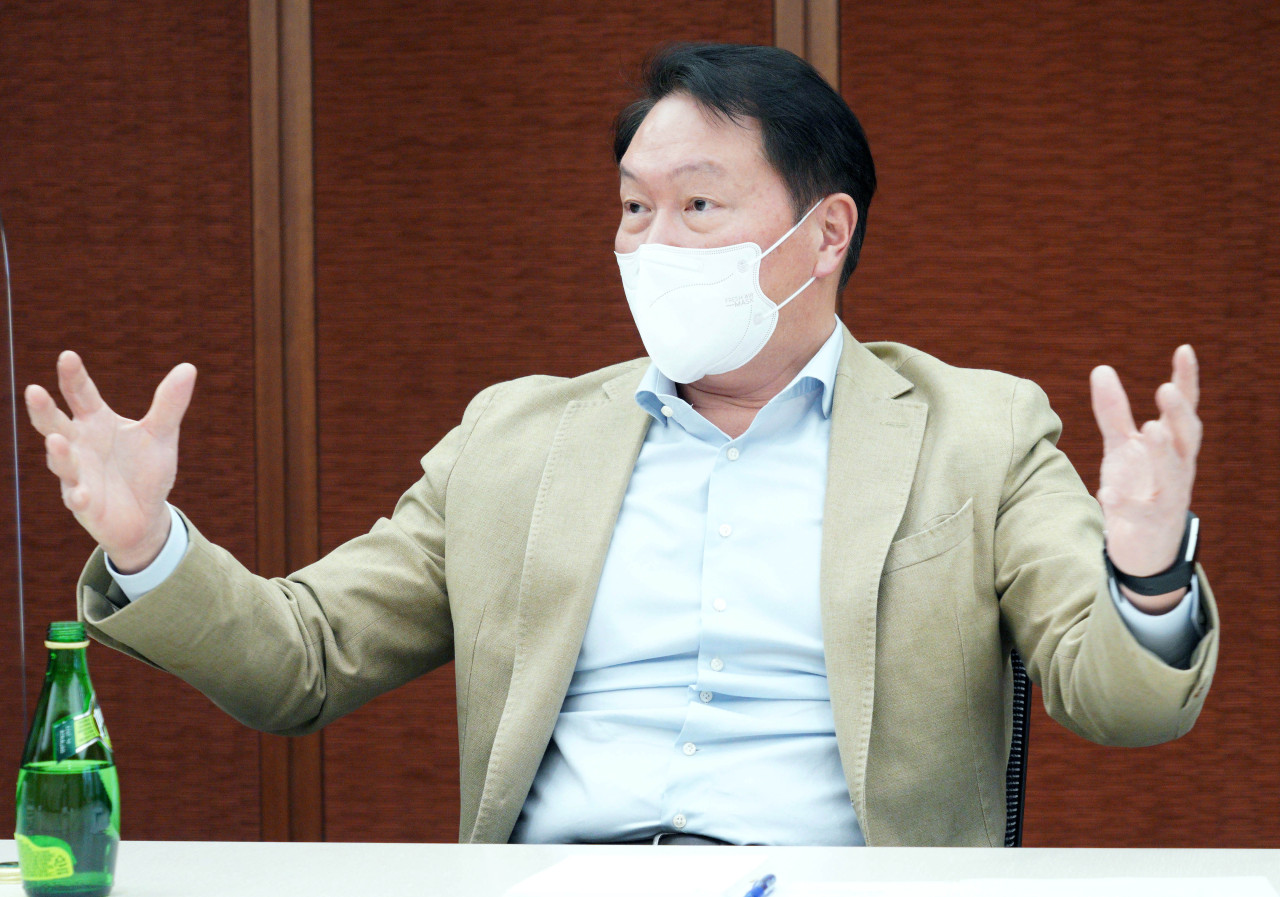SK Group Chairman Chey Tae-won, who doubles as head of the Korea Chamber of Commerce and Industry, on Wednesday showed high expectations about the private sector playing a bigger role in the agenda-setting process of the incoming Yoon Suk-yeol government.
“I think it may be the time to rethink the role of the private sector,” Chey told reporters in an interview marking his first anniversary as the chief of the nation’s largest business lobby.
“In the past, the government used to set the policy direction and listen to the opinions of the private sector after that. But now is the time to make policies together.”
He was pinning high hopes on a new private-public joint committee, one of Yoon’s campaign pledges, under which experts from all sectors are invited to join the new government’s agenda-setting process from the beginning.
Amid keen interest in Yoon’s regulatory easing, Chey said more productive and efficient discussions can be made with the participation of businesses in the reform process.
“When it comes to carbon neutrality, for instance, incentives rather than punitive measures would better encourage companies to join the initiative,” he added.
In particular, he stressed that the government should come up with a well-developed evaluation system that would play a role in creating a more voluntary business environment where consumers are guided to choose more emissions-conscious brands with higher rankings.
As for the business impact from Russia’s invasion of Ukraine, he said the current unrest could raise costs overall, but would have a limited impact on the ongoing reshaping of the global supply chains.
With the US-China rivalry escalating, supply chain issues are no longer about pricing alone, he added.
“What’s more important is after the war,” he said. “Issues like how Russia will be treated and how China will respond to it are likely to affect prices of oil and other raw materials over the long term.”
Saying that these changes would prompt “a sort of domino effect,” he urged the government to speed up measures supporting businesses to meet carbon neutrality goals by 2030.
“If there’s enough time, we can handle carbon issues without high costs. But we have no time now.”
“But at the same time there is a new opportunity for us as well. Our ‘ppalli ppalli (quick quick)’ culture can shine in tackling urgent challenges, opening new opportunities in the nascent market and offering a new growth driver for the new government,” he said.
The SK chief took office as head of the KCCI with some 190,000 members in March last year. His term is three years under a two-term system.
The Federation of Korean Industries, established in 1961, was formerly a leading business lobby. However, its role has been greatly reduced after the nation’s big four groups – Samsung, Hyundai Motor, SK and LG – departed since its involvement in the influence-peddling scandal of former President Park Geun-hye.
Asked if SK has any intention to rejoin the FKI, he said there are no immediate plans to do so, though he is willing to work together with FKI Chairman Huh Chang-soo. Huh is also the chairman of energy and retail giant GS Group. Chey Tae-won’s father is Chey Jong-hyun, the late SK chairman, and served as FKI’s chairman in 1993 and 1998.
In the meantime, Yoon’s transition committee was briefed by the Fair Trade Commission on Thursday to review pending issues that can be discussed in line with the president-elect’s campaign pledges.
One of the key topics was regulatory reforms for platform operators like Naver and Kakao. They discussed ways to prevent antitrust practices through voluntary control without hurting innovative attempts in the fast-growing industry.
Also discussed were the current rules regulating large companies with 5 trillion won in assets or more. Among others, the Yoon government aims to diminish the range of “special interest groups” of the chairman that are subject to tighter regulatory scrutiny.
By Lee Ji-yoon (
jylee@heraldcorp.com)








![[Today’s K-pop] Blackpink’s Jennie, Lisa invited to Coachella as solo acts](http://res.heraldm.com/phpwas/restmb_idxmake.php?idx=644&simg=/content/image/2024/11/21/20241121050099_0.jpg)